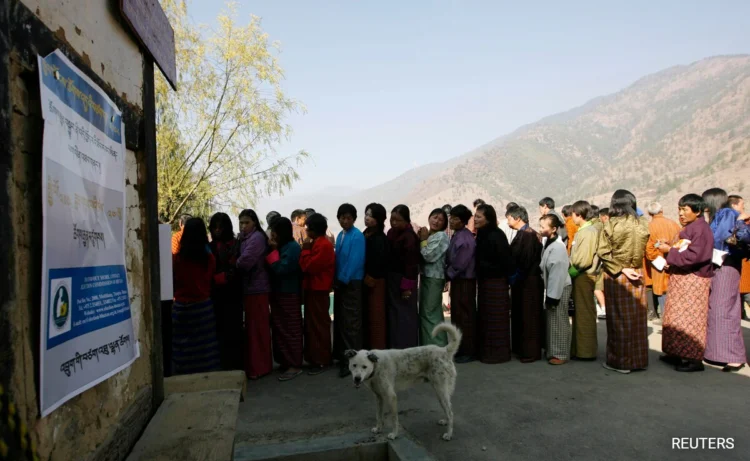On January 9, 2024, the Himalayan kingdom of Bhutan began voting in general elections with parties vowing to tackle serious economic challenges calling into question its long-standing policy of prioritizing “Gross National Happiness’ over growth. Both parties contesting the vote are committed to a constitutionally enshrined philosophy of a government that measures its success by the happiness and wellbeing of the people. Some voters ae expected to have trekked for days to cast their ballots in the landlocked mountain nation of about 800,000 people.
Problems of Bhutan
Foremost in the minds of many are the struggle facing the kingdom’s younger generation with chronic unemployment and brain drain. “Taking part in elections is about securing a better future for us said the 22-year-old student Ugyen Tshering after voting in the freezing morning mountain air in the capital Thimphu, with Buddhist prayer flags fluttering in the background. “The Job opportunities in Bhutan are scarce and the new government should focus on solving this so young people don’t leave abroad for greener pastures,” he added.
Mass Exodus
Young citizens searching for better financial and educational opportunities abroad have left I record numbers since the last elections with Australia as the top destination. Around 15,000 people were issued visas in last July, according to a news report, more than six years combined and two percent of the kingdom’s population. The issue is the key for both political parties contesting the poll. “I hope for development in rural areas said Sandhya Pradhan, a 25-year-old architect an added that boosting education and health sectors was also important.
The election booths will stay open until 5:00PM (1100 GMT) with results to likely to be announced the following day. A career civil servant Pema Chewang, the leader of Bhutan Tendrel Party (BTP) said that the country was losing cream of the nation. His opponent, the former PM and the chief of Peoples Democratic Party (PDP) chief Tshering Tobgay sounded the alarm over Bhutan’s unprecedented economic challenges and mass exodus.
His party manifesto quoted government statistics showing that one in every eight people were struggling to meet their basic needs for food and other necessities.
Squeezed between India and China
Tourism, a small share of Bhutanese economy, but a key earner of foreign currency has yet to recover from the disruptions of the Covid-19 Pandemic. The previous government pursued several projects to diversify the economy, including a Special Economic Zone (SEZ) on the Indian border and plans with a Singapore based company to raise the cryptocurrency mining scheme. Both parties have pledged a a huge ramp-up of investment in hydropower its primary source of energy.
Elections in Bhutan
Bhutan held elections for the first time in 2008 after political reforms established a bicameral parliament soon after the start of the reign of the present king, who remains popular. Namgay, aged 92, who uses only one name, said he voted in every election as democracy was something that was valued. “I am nearing the end of my life, so voting is something I will do as long as I can, he said holding up the ink-stained finger to show he had filed a ballot.
Campaigns in the Buddhist Majority country have always been subdued affairs, with strict rules mandating that election materials can only be posted on public notice boards. A primary contest in November narrowed the race down to two parties, with both the previous government’s lawmakers and their former opposition knocked out. Bhutan lies sandwiched between the globe’s two most populous countries, China and India, with both neighbors watching with keen interest as they eye strategic contested border zones.




















Comments